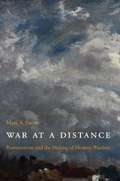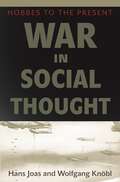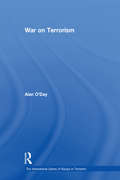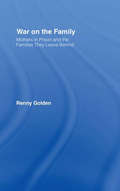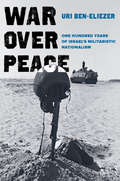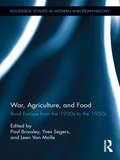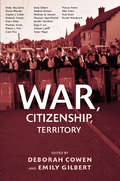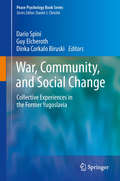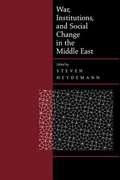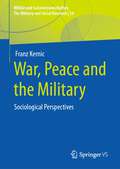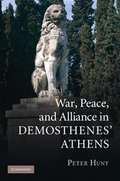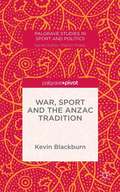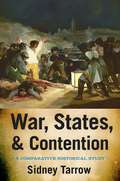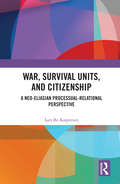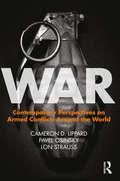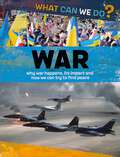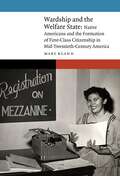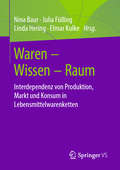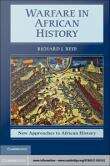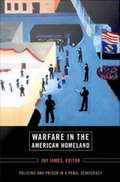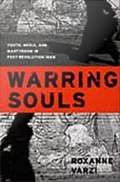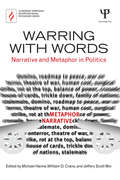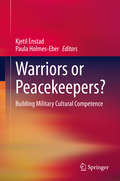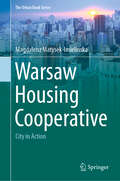- Table View
- List View
War at a Distance: Romanticism and the Making of Modern Wartime
by Mary A. FavretWhat does it mean to live during wartime away from the battle zone? What is it like for citizens to go about daily routines while their country sends soldiers to kill and be killed across the globe? Timely and thought-provoking, War at a Distance considers how those left on the home front register wars and wartime in their everyday lives, particularly when military conflict remains removed from immediate perception, available only through media forms.
War in Social Thought: Hobbes to the Present
by Wolfgang Knöbl Hans JoasA sweeping history of social theories about war and peace, from Hobbes to the twenty-first centuryThis book, the first of its kind, provides a sweeping critical history of social theories about war and peace from Hobbes to the present. Distinguished social theorists Hans Joas and Wolfgang Knöbl present both a broad intellectual history and an original argument as they trace the development of thinking about war over more than 350 years—from the premodern era to the period of German idealism and the Scottish and French enlightenments, and then from the birth of sociology in the nineteenth century through the twentieth century. While focusing on social thought, the book draws on many disciplines, including philosophy, anthropology, and political science.Joas and Knöbl demonstrate the profound difficulties most social thinkers—including liberals, socialists, and those intellectuals who could be regarded as the first sociologists—had in coming to terms with the phenomenon of war, the most obvious form of large-scale social violence. With only a few exceptions, these thinkers, who believed deeply in social progress, were unable to account for war because they regarded it as marginal or archaic, and on the verge of disappearing. This overly optimistic picture of the modern world persisted in social theory even in the twentieth century, as most sociologists and social theorists either ignored war and violence in their theoretical work or tried to explain it away. The failure of the social sciences and especially sociology to understand war, Joas and Knöbl argue, must be seen as one of the greatest weaknesses of disciplines that claim to give a convincing diagnosis of our times.
War on Terrorism (The International Library of Essays in Terrorism)
by Alan O'DayPresident George W. Bush maintained in his address of 20 September 2001, that the successful prosecution of the war against terrorism will require the judicious use of 'every resource at our command - every means of diplomacy, every tool of intelligence, every instrument of law enforcement, every financial influence, and every necessary weapon of war'. Unlike the Cold War, the War on Terrorism is neither a battle against some ideology nor bounded by physical boundaries or conventional political units such as nation-states. The War on Terrorism is the internationalisation, or rather, globalisation of previous wars. Terror is not a nation, and the enemies in such wars are not nations; any regime such as Libya simply by repudiating terrorism, can become an ally of the anti-terror coalition. Regimes that continue to practice terrorism against domestic opponents qualify to participate in the wider war if they conform to certain norms in external affairs. The 28 articles reprinted here consider aspects of that most amorphous of animals - the War on Terrorism. They do not set out to provide all of the answers; nor do they radiate a unified vision of what constitutes the war on terrorism; the pieces begin from a range of political and intellectual outlooks. Taken as a group, however, the difficulties of determining the limits and nature of the war on terrorism receive important attention. The authors address several major themes within the war on terrorism: what falls within its perimeters, its shifting manifestations, implications, responses and future directions.
War on the Family: Mothers in Prison and the Families They Leave Behind
by Renny GoldenIn this timely book, renowned criminologist and activist Renny Golden sheds light on the women behind bars and the 350,000 children they leave behind. In exposing the fastest growing prison population-a direct result of Reagan's War on Drugs-Golden sets up new framework for thinking about how to address the situation of mothers in prison, the risks and needs of their children and the implications of current judicial policies.
War on the Middle Class
by Lou DobbsHow The Government, big business, and special interest groups are waging war on the American dream, and how to fight back.
War over Peace: One Hundred Years of Israel's Militaristic Nationalism
by Uri Ben-EliezerViolence and war have raged between Zionists and Palestinians for over a century, ever since Zionists, trying to establish a nation-state in Palestine, were forced to confront the fact that the country was already populated. Covering every conflict in Israel’s history, War over Peace reveals that Israeli nationalism was born ethnic and militaristic and has embraced these characteristics to this day. In his sweeping and original synthesis, Uri Ben-Eliezer shows that this militaristic nationalism systematically drives Israel to find military solutions for its national problems, based on the idea that the homeland is sacred and the territory is indivisible. When Israelis opposed to this ideology brought about change during a period that led to the Oslo Accords in the 1990s, cultural and political forces, reinforced by religious and messianic elements, prevented the implementation of the agreements, which brought violence back in the form of new wars. War over Peace is essential reading for anyone who wants to understand the role of ethnic nationalism and militarism in Israel as well as throughout the world.
War, Agriculture, and Food: Rural Europe from the 1930s to the 1950s (Routledge Studies in Modern European History)
by Paul Brassley Yves Segers Leen Van MolleBetween the 1930s and the 1950s rural life in Europe underwent profound changes, partly as a result of the Second World War, and partly as a result of changes which had been in progress over many years. This book examines a range of European countries, from Scandinavia to Spain and Ireland to Hungary, during this crucial period, and identifies the common pressures to which they all responded and the features that were unique to individual countries. In particular, it examines the processes of agricultural development over western Europe as a whole, the impact of the war on international trading patterns, the relationships between states and farmers, and the changing identities of rural populations. It presents a bold attempt to write rural history on a European scale, and will be of interest not only to historians and historical geographers, but also to those interested in the historical background to the Common Agricultural Policy of the European Union, to which the changes discussed here provided a dramatic prologue.
War, Citizenship, Territory
by Deborah Cowen Emily GilbertFor all too obvious reasons, war, empire, and military conflict have become extremely hot topics in the academy. Given the changing nature of war, one of the more promising areas of scholarly investigation has been the development of new theories of war and war’s impact on society. War, Citizenship, Territory features 19 chapters that look at the impact of war and militarism on citizenship, whether traditional territorially-bound national citizenship or "transnational" citizenship. Cowen and Gilbert argue that while there has been an explosion of work on citizenship and territory, Western academia’s avoidance of the immediate effects of war (among other things) has led them to ignore war, which they contend is both pervasive and well nigh permanent. This volume sets forth a new, geopolitically based theory of war’s transformative role on contemporary forms of citizenship and territoriality, and includes empirical chapters that offer global coverage.
War, Community, and Social Change: Collective Experiences in the Former Yugoslavia
by Dinka Corkalo Biruski Guy Elcheroth Dario SpiniCollective experiences in the former Yugoslavia documents and analyses how social representations and practices are shaped by collective violence in a context of ethnic discourse. What are the effects of violence and what are the effects of collectively experienced victimisation on societal norms, attitudes and collective beliefs? This volume stresses that mass violence has a de- and re-structuring role for manifold psychosocial processes. A combined psychosocial approach draws attention to how most people in the former Yugoslavia had to endure and cope with war and dramatic societal changes and how they resisted and overcame ethnic rivalry, violence and segregation. It is a departure from the mindset that depict most people in the former Yugoslavia as either blind followers of ethnic war entrepreneurs or as intrinsically motivated for violence by deep-rooted intra-ethnic loyalties and inter-ethnic animosities.
War, Institutions and Social Change in the Middle East
by Steven HeydemannA fresh look at the effects of war on state and society in the Middle East, challenging traditional assumptions based on European experience. The authors argue that war has destabilized Middle Eastern states and eroded national cohesion.
War, Peace and the Military: Sociological Perspectives (Militär und Sozialwissenschaften/The Military and Social Research #56)
by Franz KernicThis book is a comprehensive analysis of the various social science approaches to explaining and interpreting war, peace and the military. Its central aim is to trace and reconstruct those basic assumptions constructed and 'thought processes' undertaken by modern social sciences in their research and conceptualization of military violence and the use of force. In addition to such reconstruction, the aim is also to enquire into the preconditions of such thought. This study therefore eschews the development of an explicit 'strategy' (in the sense of a research strategy), but instead is much more concerned with thinking about its subject matter by means of re-thinking and reflecting upon different theoretical approaches and problems. The investigation includes a critical reexamination of the tradition of military-sociological research from the beginning of modern sociology to late-twentieth century theoretical approaches regarding the security-focused and/or war-driven aspects of modern society.
War, Peace, And Alliance In Demosthenes' Athens
by Peter HuntEvery Athenian alliance, every declaration of war, and every peace treaty was instituted by a decision of the assembly, where citizens voted after listening to speeches that presented varied and often opposing arguments about the best course of action. The fifteen preserved assembly speeches of the mid-fourth century BC thus provide an unparalleled body of evidence for the way that Athenians thought and felt about interstate relations: to understand this body of oratory is to understand how the Athenians of that period made decisions about war and peace. This is the first book to provide a comprehensive treatment of this subject. It deploys insights from a range of fields, from anthropology to international relations theory, in order not only to describe Athenian thinking, but also to explain it. Athenian thinking turns out to have been complex, sophisticated, and surprisingly familiar both in its virtues and its flaws.
War, Sport and the Anzac Tradition (Palgrave Studies in Sport and Politics)
by Kevin BlackburnWar, Sport and the Anzac Tradition.
War, States, and Contention: A Comparative Historical Study
by Sidney TarrowFor the last two decades, Sidney Tarrow has explored "contentious politics"--disruptions of the settled political order caused by social movements. These disruptions range from strikes and street protests to riots and civil disobedience to revolution. In War, States, and Contention, Tarrow shows how such movements sometimes trigger, animate, and guide the course of war and how they sometimes rise during war and in war's wake to change regimes or even overthrow states. Tarrow draws on evidence from historical and contemporary cases, including revolutionary France, the United States from the Civil War to the anti-Vietnam War movement, Italy after World War I, and the United States during the decade following 9/11. In the twenty-first century, movements are becoming transnational, and globalization and internationalization are moving war beyond conflict between states. The radically new phenomenon is not that movements make war against states but that states make war against movements. Tarrow finds this an especially troublesome development in recent U.S. history. He argues that that the United States is in danger of abandoning the devotion to rights it had expanded through two centuries of struggle and that Americans are now institutionalizing as a "new normal" the abuse of rights in the name of national security. He expands this hypothesis to the global level through what he calls "the international state of emergency."
War, Survival Units, and Citizenship: A Neo-Eliasian Processual-Relational Perspective
by Lars Bo KaspersenIn this ground-breaking book, the author proposes a new theory of state formation based upon a rethinking of the nexus war, state, and citizenship. He seeks to move beyond explanations provided by traditional approaches by discussing and presenting alternative state-society and state theories, arguing that a relational-processual understanding of the states has been neglected in existing literature. The book begins with a critical discussion of the concept of the state and society in social and political theory. The author suggests an alternative theoretical-methodological framework based upon German relational theory (such as Hegel, Clausewitz, Carl Schmitt, and, in particular Norbert Elias). Drawing upon the concepts of survival unit and figuration the book provides a political, historical and sociological comparative analysis of the relation between war, state, and citizenship in France, England and Germany from the Middle Ages to the mid-17th century, with emphasis on the 16th and 17th centuries. In addition, the book addresses two puzzles in social theory. First, the author addresses the question: why is the world divided into a multiple number of units? Will it remain like this or can we expect one unit – one world state – in the future? Second, the author looks into why and how this divided world is maintained: what makes the demarcation between states and how is this demarcation upheld? The issues discussed in the book are central to political and historical sociology and will be of interest to scholars and students working in both these fields, as well as to those working in political science and IR, social theory and history.
War: Contemporary Perspectives on Armed Conflicts around the World
by Cameron D. Lippard Pavel Osinsky Lon StraussWar: Contemporary Perspectives on Armed Conflicts around the World presents a broad variety of interdisciplinary and social scientific perspectives on the causes, processes, cultural representations, and social consequences of the armed conflicts between and within nations and other politically organized communities. This book provides theoretical views of armed conflict and its impact on people and institutions around the world.
War: What Can We Do? (What Can We Do? #1)
by Alex WoolfA look at two of the biggest challenges facing our world today - war and conflict - and how we are tackling themWar and conflict have been part of the human experience for thousands of years, and take many different forms - from diplomatic cold wars to full-blown conflicts lasting many years. All wars are damaging and harmful, not only for those on the frontline, but for innocent people and children everywhere. So what can we do to make our world more peaceful?How can we build a better, fairer, more equal, cleaner world? This series seeks to answer this by exploring some of the greatest challenges facing our planet today - from disease to conflict, and from the energy crisis to the plight of refugees. It explains what is already being done to meet and tackle these challenges, and explores what more could and should be done, both individually and collectively, to ensure a better future for our planet, its people and its wildlife.Taking a positive, but realistic perspective, this series aims to empower young readers by helping them understand these complex and troubling issues, calm their anxieties, and promote empathy and understanding for the many millions of people suffering from for example, poverty or inequality.Perfect for readers aged 9 and upTitles in the series:Climate ChangeDiseaseInequalityMigrationPoverty & Food InsecurityWar & Conflict
Wardship and the Welfare State: Native Americans and the Formation of First-Class Citizenship in Mid-Twentieth-Century America (New Visions in Native American and Indigenous Studies)
by Mary KlannWardship and the Welfare State examines the ideological dimensions and practical intersections of public policy and Native American citizenship, Indian wardship, and social welfare rights after World War II. By examining Native wardship&’s intersections with three pieces of mid-twentieth-century welfare legislation—the 1935 Social Security Act, the 1942 Servicemen&’s Dependents Allowance Act, and the 1944 GI Bill—Mary Klann traces the development of a new conception of first-class citizenship.Wardship and the Welfare State explores how policymakers and legislators have defined first-class citizenship against its apparent opposite, the much older and fraught idea of Indian wardship. Wards were considered dependent, while first-class citizens were considered independent. Wards were thought to receive gratuitous aid from the government, while first-class citizens were considered responsible. Critics of the federal welfare state&’s expansion in the 1930s through 1960s feared that as more Americans received government aid, they too could become dependent wards, victims of the poverty they saw on reservations. Because critics believed wardship prevented Native men and women from fulfilling expectations of work, family, and political membership, they advocated terminating Natives&’ trust relationships with the federal government. As these critics mistakenly equated wardship with welfare, state officials also prevented Native people from accessing needed welfare benefits. But to Native peoples wardship was not welfare and welfare was not wardship. Native nations and pan-Native organizations insisted on Natives&’ government-to-government relationships with the United States and maintained their rights to welfare benefits. In so doing, they rejected stereotyped portrayals of Natives&’ perpetual poverty and dependency and asserted and defined tribal sovereignty. By illuminating how assumptions about &“gratuitous&” government benefits limit citizenship, Wardship and the Welfare State connects Native people to larger histories of race, inequality, gender, and welfare in the twentieth-century United States.
Waren – Wissen – Raum: Interdependenz von Produktion, Markt und Konsum in Lebensmittelwarenketten
by Elmar Kulke Nina Baur Julia Fülling Linda HeringDer Band betrachtet am Beispiel des Lebensmittelmarkts die drei Teilkontexte Produktion, Marktentnahme und Konsum in ihren wechselseitigen Handlungsbezügen sowie die Rolle von Macht und Wissen für die Koordination von Warenketten. Die Autorinnen und Autoren aus Geographie, Soziologie, Wirtschaftswissenschaften sowie der Stadt- und Regionalplanung widmen sich verschiedenen sich ergänzenden Aspekten der Koordination der Warenkette und der beteiligten Akteure von der Produktion, über die Logistik bis hin zum Handel und Konsum. Die Beiträge zeigen den unmittelbaren Zusammenhang zwischen Wissen und Handlungen der Akteure sowie deren Wirkungen auf die räumliche Organisation und Ordnung der Warenkette. Hinsichtlich der Rolle von Wissen geben die Beiträge eine Vielzahl an pointierten Analysen zu Teilaspekten der Gesamtinteraktionszusammenhänge.
Warfare in African History
by Richard J. ReidThis book examines the role of war in shaping the African state, society, and economy. Richard J. Reid helps students understand different patterns of military organization through Africa's history; the evolution of weaponry, tactics, and strategy; and the increasing prevalence of warfare and militarism in African political and economic systems. He traces shifts in the culture and practice of war from the first millennium into the era of the external slave trades, and then into the nineteenth century, when a military revolution unfolded across much of Africa. The repercussions of that revolution, as well as the impact of colonial rule, continue to this day. The frequency of coups d'états and civil war in Africa's recent past is interpreted in terms of the continent's deeper past.
Warfare in the American Homeland: Policing and Prison in a Penal Democracy
by Joy JamesThe United States has more than two million people locked away in federal, state, and local prisons. Although most of the U. S. population is non-Hispanic and white, the vast majority of the incarcerated--and policed--is not. In this compelling collection, scholars, activists, and current and former prisoners examine the sensibilities that enable a penal democracy to thrive. Some pieces are new to this volume; others are classic critiques of U. S. state power. Through biography, diary entries, and criticism, the contributors collectively assert that the United States wages war against enemies abroad and against its own people at home. Contributors consider the interning or policing of citizens of color, the activism of radicals, structural racism, destruction and death in New Orleans following Hurricane Katrina, and the FBI Counterintelligence Program designed to quash domestic dissent. Among the first-person accounts are an interview with Dhoruba Bin Wahad, a Black Panther and former political prisoner; a portrayal of life in prison by a Plowshares nun jailed for her antinuclear and antiwar activism; a discussion of the Puerto Rican Independence Movement by one of its members, now serving a seventy-year prison sentence for sedition; and an excerpt from a 1970 letter by the Black Panther George Jackson chronicling the abuses of inmates in California's Soledad Prison. Warfare in the American Homeland also includes the first English translation of an excerpt from a pamphlet by Michel Foucault and others. They argue that the 1971 shooting of George Jackson by prison guards was a murder premeditated in response to human-rights and justice organizing by black and brown prisoners and their supporters. Contributors. Hishaam Aidi, Dhoruba Bin Wahad (Richard Moore), Marilyn Buck, Marshall Eddie Conway, Susie Day, Daniel Defert, Madeleine Dwertman, Michel Foucault, Carol Gilbert, Sirne Harb, Rose Heyer, George Jackson, Joy James, Manning Marable, William F. Pinar, Oscar Lpez Rivera, Dylan Rodrguez, Jared Sexton, Catherine vn Bulow, Laura Whitehorn, Frank B. Wilderson III
Warring Souls: Youth, Media, and Martyrdom in Post-Revolution Iran
by Roxanne VarziWith the first Fulbright grant for research in Iran to be awarded since the Iranian revolution in 1979, Roxanne Varzi returned to the country her family left before the Iran-Iraq war. Drawing on ethnographic research she conducted in Tehran between 1991 and 2000, she provides an eloquent account of the beliefs and experiences of young, middle-class, urban Iranians. As the first generation to have come of age entirely in the period since the founding of the Islamic Republic of Iran, twenty-something Iranians comprise a vital index of the success of the nation's Islamic Revolution. Varzi describes how, since 1979, the Iranian state has attempted to produce and enforce an Islamic public sphere by governing behavior and by manipulating images--particularly images related to religious martyrdom and the bloody war with Iraq during the 1980s--through films, murals, and television shows. Yet many of the young Iranians Varzi studied quietly resist the government's conflation of religious faith and political identity. Highlighting trends that belie the government's claim that Islamic values have taken hold--including rising rates of suicide, drug use, and sex outside of marriage--Varzi argues that by concentrating on images and the performance of proper behavior, the government's campaign to produce model Islamic citizens has affected only the appearance of religious orthodoxy, and that the strictly religious public sphere is partly a mirage masking a profound crisis of faith among many Iranians. Warring Souls is a powerful account of contemporary Iran made more vivid by Varzi's inclusion of excerpts from the diaries she maintained during her research and from journal entries written by Iranian university students with whom she formed a study group.
Warring with Words: Narrative and Metaphor in Politics (Claremont Symposium on Applied Social Psychology Series)
by William D. Crano Michael Hanne Jeffrey Scott MioScholars in many of the disciplines surrounding politics explicitly utilize either a narrative perspective or a metaphor perspective (though rarely the two in combination) to analyze issues -- theoretical and practical, domestic and international -- in the broad field of politics. Among the topics they have studied are: competing metaphors for the state or nation which have been coined over the centuries in diverse cultures; the frequency with which communal and international conflicts are generated, at least in part, by the clashing religious and historical narratives held by opposing groups; the cognitive short-cuts employing metaphor by which citizens make sense of politics; the need for political candidates to project a convincing self-narrative; the extent to which the metaphors used to formulate social issues determine the policies which will be developed to resolve them; the failure of narratives around the security of the nation to take account of the individual experiences of women and children. This volume is the first in which eminent scholars from disciplines as diverse as social psychology, anthropology, political theory, international relations, feminist political science, and media studies, have sought to integrate the narrative and the metaphor perspectives on politics. It will appeal to any scholar interested in the many ways in which narrative and metaphor function in combination as cognitive and rhetorical instruments in discourse around politics.
Warriors or Peacekeepers?: Building Military Cultural Competence
by Paula Holmes-Eber Kjetil EnstadAs the past two decades of war in Afghanistan, Syria, Iraq, Darfur and the Congo have revealed, war in the twenty-first century looks nothing like the traditional state-to-state conflicts of World Wars I and II which defined the previous century. Resolving today’s conflicts - typically based on complex ethnic, religious, economic and political dynamics - requires far more than mere military strength and technology. The military officer of today must simultaneously be a warrior and diplomat, combatant and humanitarian worker, soldier and peacekeeper. But how can today’s militaries prepare their leaders for such multifaceted roles? Warriors or Peacekeepers seeks to provide answers to this question, comparing and contrasting research on the successes and failures of military cultural education and training programs in seven different countries on three continents (U.S., Canada, Argentina Norway, Denmark, Germany and the Netherlands). This anthology consists of three main sections. The first addresses the theoretical issues of developing the warrior-peacekeeper: what constitutes cultural competence in the officer profession and the pedagogical challenges associated with developing such competence. The second compares teaching practices from various military educational institutions and provides insight into such issues as: how language training can build cultural awareness, helping officers navigate the ethical and moral challenges of dealing with gender in radically different cultures and the best didactic models to develop reflective skills in military leaders. The third section examines the structural and organizational conditions which historically have aided or impeded educational and organizational change in the military. This book will appeal to military academic communities, educational institutions, scholars in security studies, peacekeeping and conflict studies; and to decision-makers in governments and administration.
Warsaw Housing Cooperative: City in Action (The Urban Book Series)
by Magdalena Matysek-ImielińskaThis book discusses the unknown and remote urban experiment of modernist social practices and dreams of a better tomorrow. It describes the history of the Warsaw Housing Cooperative not as a historical relic or a single case study, but instead analyses this working-class social housing estate – in itself an extremely interesting emancipatory project – from the perspective of contemporary urban studies.It focuses on issues related to the power of architecture, architects and the estate residents themselves: the city's performative actions, problems related to the polycentric character of the city authorities, the opportunities of building urban institutions, and social identities and urban common goods. Inspired by the history of the Warsaw Housing Cooperative, the book investigates how the estate residents, assisted by social reformers (today called urban activists), organised the urban space of performative democracy, and how they developed anti-capitalist, urban-survival strategies and created new lifestyles. It also analyses how passive tenants turned into active citizens claiming their right to the city.The inspiring book is intended for researchers in the field of performative studies, urban sociologists, critical urban studies researchers, animators of social life and urban activists.
